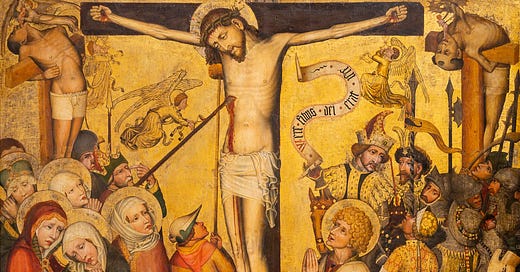Faithfulness to the Crucified
Some thoughts on following the Way inspired by Dietrich Bonhoeffer
Dietrich Bonhoeffer has been receiving more attention in recent months. A recently released movie about his life has been the subject of criticism. I haven’t seen it yet, but plan to do so at some point. His family is pushing back against the ways his thought and legacy are being misused by some in contemporary U.S. politics. (For those who want to know what Bonhoeffer actually believed, I would suggest reading some of his own writings, beginning with Life Together. For those who want to know more about his actual life, one of the best biographies is Charles Marsh’s Strange Glory: A Life of Dietrich Bonhoeffer.)
I came across this recently, from his classic work Ethics:
In a world where success is the measure and justification of all things the figure of Him who was sentenced and crucified remains a stranger and is at best the object of pity. . . . The figure of the Crucified invalidates all thought that takes success for its standard.
Success is not the standard for followers of the Way of Jesus, at least as we often conceive of it. Power, fame, and wealth are subject to the same criticism Jesus gave of the hypocritical religious leaders of his day. They are like whitewashed tombs - appealing on the outside, at a superficial level, but on the inside they are and offer only rot and decay. Devotion to power, fame, or wealth, like religious hypocrisy, will ruin a life from the inside out.
Some other forms of “success” that many American Christians chase include shallow forms of happiness, mere comfort in our daily lives, numerical growth in our churches and ministries, and much more. For many years I’ve thought that flourishing, understood in a Christian sense of the term, is an important goal for followers of Christ. I still do. The biblical ideal of shalom shares much with the notion of flourishing. But I’ve come to believe that a key aspect of what we should aim for as Christians, even more fundamental than flourishing, is faithfulness. Trials and tribulations will come. Tragedy, sin, and death can undermine our flourishing and our experience of shalom. Our efforts at loving the poor and the broken might not be “successful.” But we follow the Way of Jesus, anyway.
At the end of our lives, we can hope for many good things. But it is interesting that in the parable of the talents, the master praises two of the servants for being faithful in a few things. Then, as a result of that faithfulness, they are invited to share in their master’s happiness (Matthew 25:14-30). Even more to the point, consider these words from Paul in 2 Timothy 4:6-8:
For I am already being poured out like a drink offering, and the time for my departure is near. I have fought the good fight, I have finished the race, I have kept the faith. Now there is in store for me the crown of righteousness, which the Lord, the righteous Judge, will award to me on that day—and not only to me, but also to all who have longed for his appearing.
I believe our lives can and should exemplify the supernatural, that answered prayers and growth in virtue in a transformational union with Christ are central parts of what we can expect as followers of Jesus (Romans 12; 2 Peter 1; Galatians 5; James 5). We can become, to a significant degree, “little Christs,” as C.S. Lewis so memorably put it.
But flourishing is not our primary calling in this already/not yet era of human history. The kingdom of God is coming now. We share that kingdom and serve that kingdom and bring our lives under the rule of that kingdom in the here and now. We can expect a significant degree of flourishing, of shalom, as we do so. This is a natural result of our union with Christ and the work of the Spirit and the Church in our lives. But God may call us to sacrifice at least some of our flourishing in the here and now, for the sake of others. This is to be expected in our fallen world, where sin is present and powerful and hinders shalom. In this way, we imitate, in Bonhoeffer’s words, “the figure of the Crucified.”
At the end of our lives, as we enter into the life that is truly life, where shalom in its fullness will be the substance of every aspect of our existence, success will not be on our minds. At least it shouldn’t be. Faithfulness to Christ, rather than success or even flourishing in Christ, is our highest calling. That is what I hope we can reflect on, with gratitude, both now and at the end of our time in this life. Faithfulness to Christ is a choice we make minute by minute, hour by hour, day by day, in the power of the Spirit of Christ, as we seek to love God, our neighbors, and our enemies. This is our calling. This is the Way of the Crucified.




